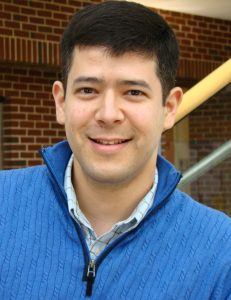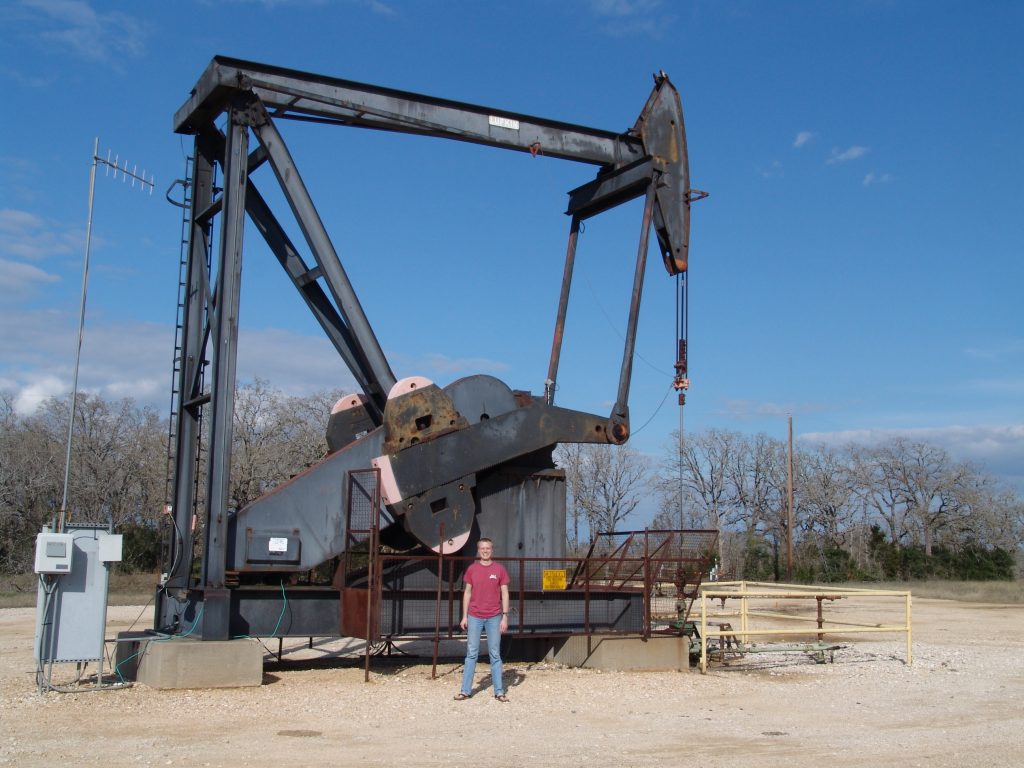Meet the 2017 Duke Energy Faculty and Graduate Fellows
November 3, 2017The Duke Energy Fellows program, administered by the UNC Institute for the Environment, is funded by a grant from the Duke Energy Foundation to develop leaders in the energy sector. The Duke Energy Faculty Fellowship supports one faculty member per year interested in assembling teams to pursue interdisciplinary funding opportunities on energy topics. The Duke Energy Graduate Fellowship program supports 2 graduate students working on energy-related research.
Meet the 2017 recipients.
2017 Duke Energy Faculty Fellow
 Orlando Coronell
Orlando Coronell
Associate Professor
Department of Environmental Sciences and Engineering
Describe your research in six words.
“Energy generation/storage using salt water” – boom!
How will the Duke Energy Faculty Fellowship enhance your research?
The funds that come with the Duke Faculty Fellowship help me cover the time effort needed to develop proposals to seek the funding needed from state, national or international entities to achieve our research goals. The recognition that comes with the fellowship enhances our chances of securing such funding.
Why is this research important?
An important obstacle in the realization of renewable energy (solar/wind/etc) as a primary source of energy around the world is the lack of appropriate and affordable energy storage technologies (i.e., batteries) to store the energy generated during peak production times (e.g., when it is sunny) to use it later during peak consumption times (e.g., night time). Our research on energy storage addresses this challenge.
Why is this fellowship important to you?
Perhaps the most important aspect of the fellowship is the recognition that comes with a fellowship from Duke Energy, and the validation of the importance of the topic of our work.
2017 Duke Energy Graduate Fellows
 Trey Murphy
Trey Murphy
Doctoral student
Geography Department
Describe your research in six words.
For sale: Invisible properties in Texas
How will the Duke Energy Graduate Fellowship enhance your research?
The Duke Energy Fellowship has already been immensely helpful in my research. Last summer, I sifted through thousands of archival pieces at the University of Texas and conducted interviews with stakeholders who have an interest in subsurface property[1] conversations in Texas. Because of the Fellowship, I can spend about an hour or more every morning analyzing the data that I collected from this past summer and contextualizing my findings within larger conversations that theorize about property. Similarly, I am using some of the fellowship money to present my initial findings at a regional conference in Texas, where I am meeting with other energy geographers interested in property rights debates. By staying engaged with local collaborators, I can keep my project relevant and connected to those for whom the findings are most germane, as well as maintain local contacts that can help distribute my findings to property owners across the state. Finally, with the extra time, I have been able to investigate new methods to incorporate into my research, such as courthouse documents and innovative survey methodologies.
[1] I use “mineral property/owner/estate” and “subsurface property/owner/estate” interchangeably.
Why is this research important?
At the most basic level, my research examines property rights in Texas—however, not just any property rights, but rather subsurface property ownership. Subsurface ownership is complex in that property relations are clearly defined yet the level of “privacy” is dependent on state and national policy objectives. For example in every state, the subsurface can be “severed” from the surface estate and treated as a separate, transferrable property. In essence, that means that the proprietor owns an estate that they will never see—a piece of property that is below the surface—but can use that ownership tenure to compel other property owners in the same “column” of property to relinquish part of their rights. Oftentimes, the rights to the subsurface supersede surface, water, and other property rights, which facilitate the extraction of hydrocarbons at the expense of non-mineral estate owners. Through policies enacted during “energy independence” movements in the 1970s, some mineral properties can be forced into lease agreements without compensation through rulings issued by state hydrocarbon regulatory bodies. Texas accounts for 37% of oil and 26% of domestic natural gas production, and consequently serves as an ideal case study for interrogating how U.S. national/state energy policies on “energy independence” intersect with property. My research seeks to uncover three related themes: first, who are the subsurface owners in the state of Texas? Second, how do mineral owners think about their properties? Third, why do they decide to drill for oil and gas? By answering these questions, we, as researchers, can begin to probe how individual decisions on property ownership relate to broader themes such as energy independence, petroleum exports, hydrocarbon reserve estimates, economic development, and climate change.
Why is this fellowship important to you?
At a basic level, this awarding of this fellowship excites me, because it indicates that there is a broader interest in learning more about mineral estates. There has been a big focus on surface property ownership in the academic literature, but for a variety of reasons, few researchers have explored the importance of subsurface property ownership.
More intrinsic to my personal interests, I am using this fellowship as a way to investigate something that I have been curious about since I was child. When I was very young, my family and I moved from Fort Worth, Texas, to a small suburban llama ranch 30 miles outside the city. One night, I remember as a teenager looking out my window and peering at a sea of ten-story drilling rigs that filled the eastern horizon and whose light flooded my bedroom with the vigor of a midnight sun. The subsurface manifested itself as a spire of men and metal that mechanically and systematically thrust pipe, water, sand, and gels thousands of feet into the subsurface with a racket so deafening my family could barely sleep despite being half a mile away. Lacking subsurface property rights, my family listened powerlessly as the natural gas extracted directly benefited someone completely unfamiliar to me—the mineral owner. I do not fault the mineral owner for choosing to extract the hydrocarbons; no doubt, the opportunity for financial gain was significant.
But the curiosity has plagued me ever since: how did my family loose our ability to benefit from this extraction and why did the natural gas well that snaked under my family’s property not directly benefit my family? This fellowship offers me the opportunity to explore this topic as well as understand how property ownership can link with broader themes that mineral owners and non-mineral owners are interested in.
 Patrick Doyle
Patrick Doyle
Doctoral student and research assistant
Physics Department
Describe your research in six words.
Examining electrical properties of heterogeneous systems
How will the Duke Energy Graduate Fellowship enhance your research?
The fellowship gives me an opportunity to really focus on crafting and executing experiments that demonstrate processes that are fundamental to systems that are frequently encountered in many industries.
What do you hope to accomplish with your fellowship?
I hope to be able to answer some questions we’ve had regarding material interaction of dense systems in an electric field.
Why is this research important?
Our research aims to more fully develop some details that are scarce in the existing literature which will enable smarter application of techniques already in place in industries such as oil and gas.
Why is this fellowship important to you?
I feel strongly in the role that basic science plays in responsible energy harvesting and believe that this fellowship allows that relationship to develop.
